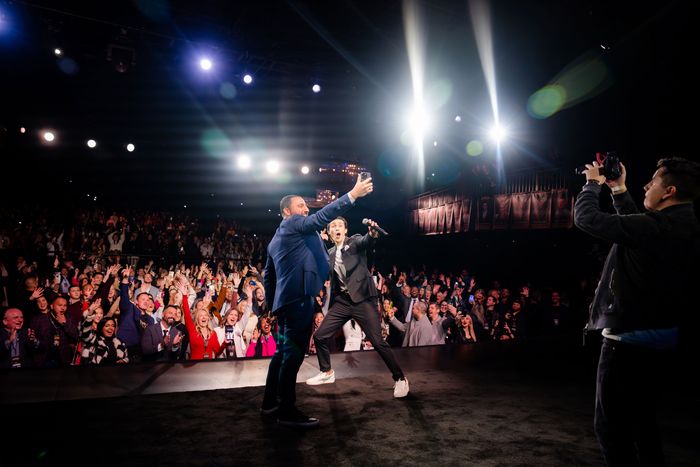A selfie from the stage at Goldbar Live.
Photo: Goldbar Training
“I wake up, bleed, sleep real estate — shit real estate,” a broker from Yonkers tells me when I ask him how business is going, projecting his voice to rise above the happy-hour noise. “Everything is real estate.” This was more or less the mood inside the carpeted lobby of the Palladium on a recent Thursday night, as a few hundred brokers milled around exchanging business cards and sipping wine from a cash bar. “You’re gonna fail, but you gotta get back up,” says a woman in a leather miniskirt specializing in medical and health-care properties when I ask her how she plans to succeed. A man wearing oversize black glasses talks to me about his “follow-up game,” which is “incredible” right now. “I’m locked in and focused,” he says.
Extreme optimism is one way to navigate an industry where the gap between the winners and losers is often vast, and a growing share of the New York market is all-cash buyers looking for high-end buildings. (The Financial Times reported this week that the median sales price in Manhattan right now is $1.15 million and nearly 70 percent of buyers in the borough didn’t have a mortgage.) To flourish under these conditions, you had to be a certain kind of broker — one willing to take 4 a.m. client calls, master their angles on the climb toward semi-celebrity, and shell out at least $299 to spend the day at a church-revival-meeting packaged as a real-estate conference in midtown.
Ryan Serhant (middle) and Juan Barreneche (right).
Photo: Goldbar Training
The event, Goldbar Live, was headlined by Million Dollar Listing’s Ryan Serhant and Josh Altman, both god-tier broker-showmen, who were there to share their tips. It was organized by a 30-year-old Queens-based businessman named Juan Barreneche — a real-estate broker since 2016, Barreneche abandoned a medical career and joined the industry after reading the 1997 personal-investment book Rich Dad Poor Dad. Now he operates a consultancy called Goldbar, selling virtual assistants and real-estate coaching via conference call. Ticket prices ranged from $99 (for seating in the back theater) to a $1,977 “diamond level” including an exclusive workshop with headliners and “VIP luxury agent networking” the following day. (The Thursday mixer was open to anyone who’d paid $299 or more, which made them silver level.) But wasn’t it worth it if being in the room could change your life? (“Deals will be made in that room,” Serhant said while promoting the event.)
The agents in attendance were eager to brand themselves as allies and natural successors to the millionaires who’d taken the stage. “So what do you do when someone says they want the house you’re showing them?” Serhant, in an electric-blue suit and sneakers, asked in the darkened theater. “Tell them they can’t have it!” someone shouted from the audience.” This was the right answer. “Fuck yes,” he shot back. “You tell them: No! You can’t have it!”
It all resonated with Alex Calle, who calls himself the “Jersey City Realtor,” who stood in the lobby after the presentations in a shiny blue suit, his mustache waxed into spirals. During the conference, he says, Christie’s Aaron Kirman spoke about how he “didn’t come from much” but ended up selling $50 million homes. He could relate. Calle, who is in his late 20s, says he made his first million-dollar real-estate transaction at 21, ten months into the gig. His mom had just lost her job. He knew what he had to do. “I thought to myself, I gotta make money, and I gotta make money now,” he says.
The come-up narrative was everywhere at the Palladium but harder to find in the market: Many brokers, particularly when they’re starting out, hold down second jobs to pay their own rent during inevitable moments of market flux. Many are as broke as the people who can’t afford to buy houses from them. “Everyone’s working for themselves,” one agent told me, “so at the end of the day, we’re working for free until we pull something.” Others quit or get fired. The Yonkers agent, gesticulating broadly and dressed in a dark suit, had seen it in real time. He’d started out with a team of ten that recently downsized to three.
On white couches in the corner of a room, a 20-year-old agent who’d traveled from Georgia with a friend working the event said he’d actually only been practicing for about ten months — he’s playing the long game, chatting with his neighbors, hoping to break in. Nearly everyone there at the event had a story about a well-timed knock on a door or fortuitous meeting with the owner of a valuable property. The fresh broker, who declined to give his name, said he’d been looking for a way to make his fortune. He’d gotten into social media first, then personal training. He’d turned to real estate after hearing it was quicker to stack cash that way and left the conference feeling even more convinced that he could make his mark. The entire day had been one long success story. “Now I’ve learned that anything is possible,” he said.
Credit: Source link

